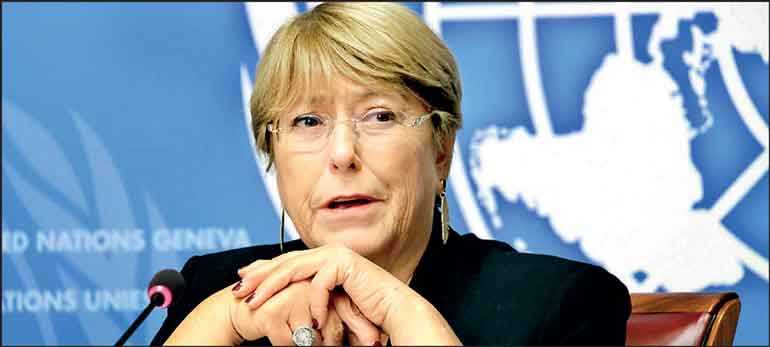Thursday Feb 19, 2026
Thursday Feb 19, 2026
Saturday, 30 January 2021 00:00 - - {{hitsCtrl.values.hits}}

UN High Commissioner Michelle Bachelet’s report on Sri Lanka contains a devastating and unprecedented critique of the handling of human rights in the country, and its recommendations have escalated the possible interventions of the Council beyond anything that has been proposed to the Council to date
 The UN Human Rights Council’s first session of the year 2021 to be held from 22 February to 23 March is the most important because it opens with the participation of member states at the ministerial level, known as the High-Level Segment. Often, foreign ministers, ministers of human rights, justice ministers and others of similar rank speak at the Council on behalf of their countries and take up issues of human rights around the world.
The UN Human Rights Council’s first session of the year 2021 to be held from 22 February to 23 March is the most important because it opens with the participation of member states at the ministerial level, known as the High-Level Segment. Often, foreign ministers, ministers of human rights, justice ministers and others of similar rank speak at the Council on behalf of their countries and take up issues of human rights around the world.
As in the other two sessions held later in the year in June and September, the United Nations High Commissioner for Human Rights presents her own reports of the work commissioned by the Human Rights Council. In addition, experts appointed by the Council on thematic issues known as Special Procedures also present their reports on their country visits and studies of human rights situations in the countries designated for scrutiny.
The report of the High Commissioner on Sri Lanka contains a devastating and unprecedented critique of the handling of human rights in the country, and its recommendations have escalated the possible interventions of the Council beyond anything that has been proposed to the Council to date.
The logic of this escalation is based on the High Commissioner’s conviction of an accelerated deterioration in civic, political, minority, religious and other democratic rights under the present administration which she explicitly states needs the UN Human Rights Council’s “urgent attention”.
The High Commissioner will also be presenting her findings to the General Assembly in New York through the Economic and Social Council (ECOSOC) in furtherance of her mandate specified in General Assembly Res-olution 48/141. In this context, some of her recommendations assume an added significance.
There are recommendations that she makes to the member states that Sri Lanka should not ignore. One is that member states may consider the referral of the Sri Lankan case to the International Criminal Court. This is unprecedented. A reading of the report clearly suggests that this was occasioned by what she perceives as the early warning signs of a dangerous trend: rapidly escalating militarisation and the closing of democratic space by the present Sri Lankan administration, rather than as a response to the Tamil Diaspora lobbyists’ long-standing demands.
Another recommendation is the application of the principle of Universal Jurisdiction, which was first proposed by previous Human Rights High Commissioner Zaid-al-Hussain.
Universal Jurisdiction enables a state to claim criminal jurisdiction over a person accused of a crime regardless of their nationality and place the crime was allegedly committed. Former President of Chile, Augusto Pinochet was arrested in London in 1998 on a Spanish warrant charging him with human rights violations in Chile during his time in office. He was extradited to Spain and was tried in a Spanish court under the principle of “universal jurisdiction”. His claims of immunity were rejected by the British Courts on the grounds that torture and crimes against humanity did not form part of the “functions” of a head of state.
No member state acted on High Commissioner Zaid-al-Husain’s urging with regard to Sri Lanka, agreeing to let Sri Lanka investigate alleged violations of human rights through local processes. The context in which it has been suggested this time is significantly different from previous years with High Commissioner Michelle Bachelet emphasising the current practices of the Sri Lankan government which she describes as “trends emerging over the past year, which represent clear early warning signs of a deteriorating human rights situation and a significantly heightened risk of future violations, and therefore calls for strong preventive action.” Such language during peacetime in Sri Lanka is a cause for concern all round and warrants serious attention.
The Sri Lankan Government will have to respond. If it doesn’t do so effectively, it will have an impact not only on the Government but also on individual officials, because the High Commissioner also recommends “possible targeted sanctions such as asset freezes and travel bans against credibly alleged perpetrators of grave human rights violations and abuses”. The current Army Commander has already had a travel ban imposed on him, and as such these should not be regarded as empty threats.
In addition, she recommends the application of “stringent vetting procedures to Sri Lankan police and military personnel identified for military exchanges and training programme”. Sri Lanka has already faced the consequences of this form of punitive action where members of the Sri Lankan military were denied opportunities for training. Furthermore, the report calls for continued review of Sri Lanka’s contribution to UN peacekeeping operations.
Even if Sri Lanka were to ignore the contents of the High Commissioner’s Report, it will still have to deal with the consequences of its recommendations, if any of the member states or indeed individuals decide to act on them. An effective response will be essential if Sri Lanka is not to be seen by possible investors as a place likely to deteriorate into violent conflict and widespread human rights abuses. That is not an attractive climate for investment decisions.
The Secretary to the Ministry of External Affairs has claimed that Sri Lanka is a peaceful country 12 years after the end of the war and to be accused of human rights violations was “unfair”. This will not be a good enough defence in Geneva where the issues brought up in the report have little to do with peace now but with lack of progress on accountability for alleged incidents of war crimes, failure to establish credible local processes, reducing space for democracy, increasing militarisation, and surveillance of civic actors and journalist, to list a few.
Asserting that no one has the right to dictate to us about democracy contradicts the logic of the UN Human Rights Council that all member states of the UN have a duty to speak on any concerns regarding human rights, including political and civil rights. There is in fact an open agenda item called “Any other matter requiring the Council’s attention”. During the war years, Sri Lanka was brought up often under this agenda item even if it was not formally included in the agenda. Sri Lanka needs a far better strategy of engagement which takes that into account.
Three Special Procedure mandate holders of the Human Rights Council issued a joint appeal to the governed of Sri Lanka on 25 January 2021 urging the Government to stop what they termed “forced cremations”. This issue will surely be brought up at the Council and the language of the joint appeal indicates the form it will most likely take.
The Special Rapporteurs attribute the Government’s decision to disallow burials of COVID fatalities to “discrimination, aggressive nationalism and ethnocentrism amounting to persecution of Muslim and other minorities in the country”. This is very strong language and the Rapporteurs were hardly detained by the peaceful nature of the country at present. A Government Minister’s protest that they will be guided by the WHO and local experts will inevitably fail to convince the Council due to the fact that both WHO guidelines and a stellar committee of local experts appointed by the Prime Minister, recommended both burial and cremation as safe options for COVID-19 fatalities.
The Secretary/External Affairs fears that the north will hijack the agenda of the Council to target Sri Lanka. The Human Rights Council does not have any veto-wielding members and membership is based on equitable geographic distribution. This means that there are fewer member states from the global North and more from the global South.
Sri Lanka was already placed formally on the agenda of the upcoming session as per earlier resolutions which requested the High Commissioner to monitor and report on its progress to the Council at this session. Her latest report on Sri Lanka is presented in that context.
It has been revealed that the External Affairs Ministry is awaiting the draft of a resolution on Sri Lanka being proposed by UK, Canada, Macedonia, Germany and Montenegro. It is expected to be a ‘consensual resolution’. The Foreign Secretary stated in an interview with the Daily Mirror that this was “the only thing on the table”. If this is the case, it is an important fact.
Consensual Resolution requires a consensus between the parties by definition. If it fails to achieve that or is challenged by Sri Lanka, it will be presented to a vote at the Council. It is then that the 47 member states of the Council will support or oppose the resolution which will be adopted if a majority of countries vote in support. However, all member states of the UN and ECOSOC registered NGOs, if they inscribe their names to speak on the matter, are able to present their views before the vote, to persuade the voting members either way. The Global South can have its say as much as or even more than the Global North.
While this administration withdrew from previous resolutions which were co-sponsored by the earlier regime, this resolution will need the Government’s full engagement through our diplomats in Geneva if it hopes to persuade the Council of its position on Human Rights in Sri Lanka. Given the tone and tenor, Conclusions and Recommendations of the High Commissioner’s Report on Sri Lanka and the perception of the Special Rapporteurs of Sri Lanka’s motivation in its public health decisions on COVID-19 deaths, the Government of Sri Lanka has its work cut out for it.
(Sanja de Silva Jayatilleka is the author of ‘Mission Impossible-Geneva: Sri Lanka’s Counter-hegemonic Asymmetric Diplomacy at the UN Human Rights Council’, Vijitha Yapa, Colombo, 2017.)